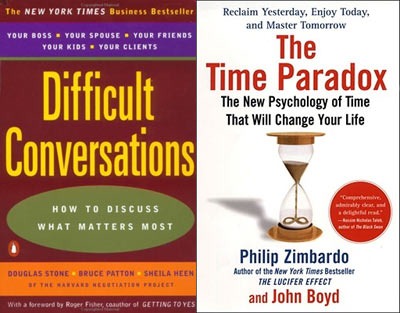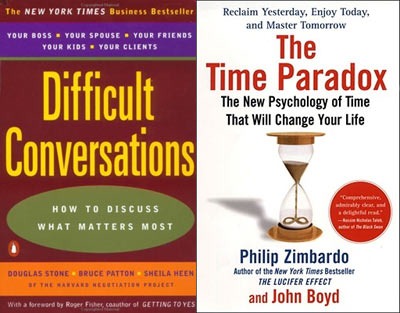
Today I’m going to talk about two weaknesses I have and two excellent books which address them. One book was recommended by my friend Brian Sharp during an awesome presentation he did at the Game Developers Conference (video coming soon, Brian?). It’s called Difficult Conversations. The second is called the Time Paradox, which I got off my friend Derek’s reading list (Derek provides notes for every book, which gives you a good idea of whether you’ll like it or not).
Self Expression
Unless I’ve dated you in the past, you might be surprised to hear that I’m not very good at expressing myself. The irony, of course, is that blogs are about self expression, and the authors that make themselves most vulnerable often have the most success. But if you look at my past articles, I very rarely talk about my feelings. I’m transparent about who I am, what I do, what I’ve done, where I go, what I think, etc., but how I feel is notably absent.
This is mostly true in real life, as well. I joke around a lot and I’m sarcastic, often in excess, probably because it spares me the necessity of talking about how I feel about anything. In most situations this is fine, and in most situations I don’t really have any feelings that ought to be talked about.
In other situations, especially in relationships, it does become a problem. An ex once called one of my friends, crying, saying “Tynan has no emotions!”. When I go into a relationship and never express how I feel or show any vulnerability, I don’t get as close as I could. The girl either responds by also clamming up, or by getting frustrated when she opens up and I don’t. My lack of emotional output is incorrectly interpreted as a lack of interest.
Two events in my life contributed to this. Gambling is the first; being a professional gambler over a long period of time required me to disconnect somewhat from my emotions. Life is too stressful if you get excited every time you win and get upset every time you lose. By the end I could win tens of thousands in a day and it felt like a normal day. When I got busted at the end and lost more than that, I also went about my day like usual. Overall I consider this to be a positive thing, but few things are completely positive or negative. Emotions can be fun, and I don’t feel a lot of them. I’m too pragmatic, maybe.
Pickup also contributed. Before pickup I made the mistake of sharing WAY too much with every girl. Beyond the point of making myself vulnerable, I would tell the girl everything I was feeling, which made my emotional state her responsibility. Since then I’ve been on the other side of the fence and I understand what a burden it is. The antidote in pickup is to cleverly avoid any sort of rejection by never showing any emotion. This works well in the club, but once you’re trying to actually connect with someone it becomes an impediment.
I bought Difficult Conversations pretty much exclusively because Brian is an excellent communicator. He strikes a good balance between being light and serious, and I thought that maybe if I read the book I might be pulled over to the serious side a bit more.
But what Difficult Conversations boils down to (to me, at least) is how to express emotion in a reasonable way. It’s so well articulated that even being as resistant to emotional self-expression as I am, I found myself nodding in agreement as I read it. The authors give a lot of examples of conversations. The “before” conversations are realistic and to the untrained reader seem hard to negotiate. The “after” conversations are also realistic and do a good job of putting the techniques in context. Near the end the examples became a bit contrived and unrealistic, but that was only the last ten percent.
Another thing I liked about Difficult Conversations was how well it handled my objections. I’d be thinking, “Yeah, but you can’t just go around dropping your emotions on everyone in your path”, and two chapters later they’d talk about the importance of restraint and “negotiating with your feelings”.
One of the most valuable ideas I picked up from Difficult Conversations is that the conversation you think you’re having isn’t really the one you’re having. People tend to argue the facts and blame, but these aspects don’t create productive conversations. Instead, what people are actually thinking about (and trying to convert into facts and blame) are how each one contributed to the situation, how they feel about it, and how they think the situation reflects on them. The reason you talk about these things isn’t to make everyone feel good and happy, but because they’re the root causes of the difficult conversation, and only by addressing them can you work towards resolving the situation.
Relating to Others
I almost gave up reading Time Paradox halfway through. They have a quiz you can take to see how close to the ideal “time perspective” you are, which I took. I was dead on for all but one, which was the “future fatalistic” timeline. I expressed that I didn’t have any expectation of anything happening after I die, and apparently I should believe that God is going to take care of me.
So I almost stopped reading, thinking “these guys are idiots”. I still don’t agree that I should believe that something magical happens after I die, but I’m really glad I stuck with the book. It talks about how each individual views the past, present, and future and how these views shape our lives and decisions.
Time Paradox is full of scientific studies, and it’s made very clear that the authors have spent their lives dedicated to researching how we interact with time. The biggest thing I got out of it was an understanding of why other people make some of the decisions that they make. I can think of a number of situations where people made decisions that really baffled me: taking dumb risks, passing up huge opportunities, making weird career decisions, not making health a priority. As I read the book, though, I realized that when you see the world through different time perspectives, you have different priorities and thus make different decisions.
I’ve always found it difficult to put myself in other people’s shoes, but Time Paradox helped a lot. Even if I wouldn’t make the same decision that someone else would, I can better understand his motivations, priorities, and thought process. Fascinating and useful stuff.

Leave a Reply